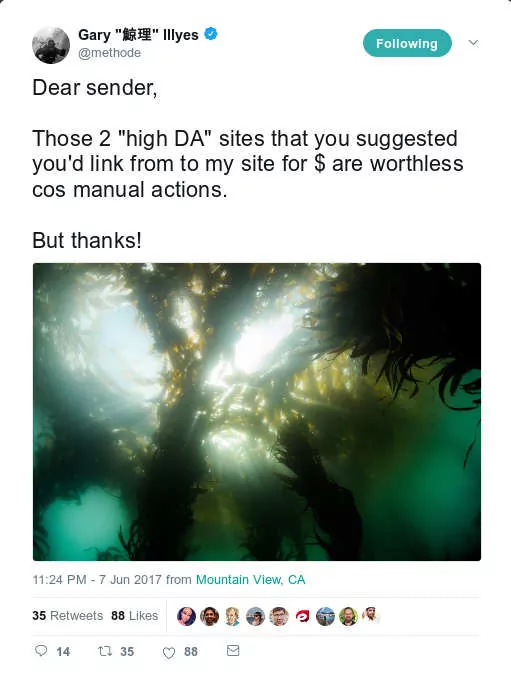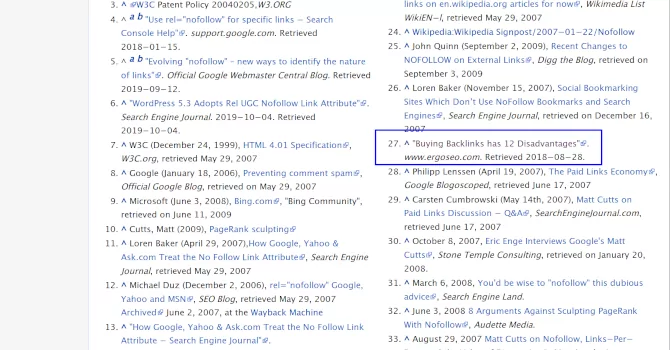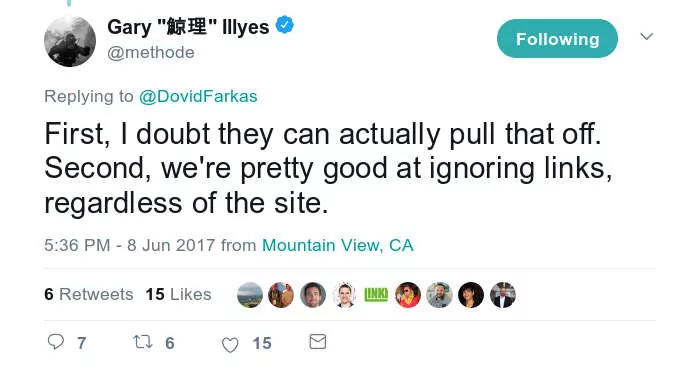Contents
- 1 Not Safe to Buy Backlinks
- 2 Paid backlinks may Cause Penalties
- 3 Paid Backlinks Have Less Value than Natural Backlinks
- 4 Buying Backlinks Won’t Necessarily Improve your Rankings
- 5 Paid Backlinks Are Time-sensitive
- 6 Paid Backlinks Have Recognizable Patterns-Footprints
- 7 Openly Advertised Backlinks
- 8 Natural-looking Βacklinks Αre Ηard to Find
- 9 Self-penalizing Behaviors
- 10 Spending Money on Backlinks Limits Growth
- 11 Let a pro handle the details
Not Safe to Buy Backlinks
This article is mentioned in Wikipedia as a source.
The intent of writing this article is to help webmasters understand the risks involved in buying backlinks and the low value of using old growth methods.
Google now has much more developed blockers that ignore those paid or manipulated links instead of penalizing them as harshly or as much as before. Practically, Google runs a sort of backlinks disavow internally without the need to submit lists of spammy backlinks.
Let’s go through the reasons why you shouldn’t buy any backlinks or do it in bulk.
Paid backlinks may Cause Penalties
Search engines react when people buy backlinks. As a result, they might remove your website from their index (demotion, thrown out of the main index, keyword-specific penalty, or Google Penguin penalty) without any previous warning (due to unnatural link-building methods, or algorithmic penalty without the need for a human reviewer). Buying backlinks is considered spam, a black hat SEO technique. It can put your website out of business permanently if you don’t get any organic traffic.
Paid Backlinks Have Less Value than Natural Backlinks
Especially if the site linking back is not relevant to your topic/niche. For example, a backlink from a travel website that points to a lawyer’s website regardless of the anchor text is relevant.
Buying Backlinks Won’t Necessarily Improve your Rankings
Does buying backlinks improve rankings rather than earning them naturally? Most of the time, they look, and are, unnatural and manipulated (wrong placement e.g. topic, link farms, lack of niche relevancy). Earning backlinks naturally is admittedly quite hard, but also paying for links is not the best to do when they are ineffective and you are on a budget.
Paid Backlinks Are Time-sensitive
Either they disappear after a short while (usually the content is removed by the webmaster), or the site linking back goes out of business or penalized, i.e., cheap PBN link sellers dealing with high deindex rates. Backlink vendors or virtual assistants that build links at public platforms are prone to spam (software blasts), and those links will not remain up for long.
Paid Backlinks Have Recognizable Patterns-Footprints
Link publishers commonly use the footer or the sidebar (non-contextual backlinks, thus low-quality) to link back to buyers, signaling unnatural, manipulated backlink schemes. Other patterns include external linking in bulk, abnormal external linking graphs, not relevant topics, non-contextual backlinks, no real traffic, built for the only scope of selling links, etc., factors that augment the risk for receiving sites (penalties in the worst case, or just lost funds).
There are a few cases where the link trade is not recognizable, and both parties keep the scheme secret and link quantities low. In this case, provided that the backlinking page is relevant, the backlink will count and will be of high quality. The problem is that those freelancers who sell backlink packages are looking to make a quick buck and are not interested in quality standards. If a method works for them they tend to stick to it for each new client, thus threading a very obvious link pattern.
Openly Advertised Backlinks
Prominent link brokers advertise their services openly via email marketing or have built a platform for trading backlinks. What is more obvious than that? Such behaviors offer an easy way to track link schemes, and sooner or later, anti-spam teams can expose entire link networks. Some people argue with that assertion based on the fact that the web is vast, and Google has limited resources to monitor link trading. If that was the case, how come websites are being penalized for unnatural backlinks?
Natural-looking Βacklinks Αre Ηard to Find
It is hard to find paid backlinks created with close to natural patterns, meaning with niche relevancy and not coming from a link farm or a toxic website. Sites selling backlinks offer no guarantee against Google penalties. The risk falls on the advertiser’s/buyer’s shoulders. Even when publishers provide reviews for their services it does not change the fact that they breach search engine policies. Reviews can be leaked too, or advertised publicly.
Self-penalizing Behaviors
When the buyers figure out that the previous set of backlinks hasn’t improved their rankings, they might try buying massive quantities of links, eventually getting busted and losing their money. The only wins are for the link publisher and the middlemen.
Spending Money on Backlinks Limits Growth
Link buyers are bound to link schemes missing opportunities to build up organic traffic, brand awareness, website authority, etc.
My inbox is full of offers to buy guest post links from $20 up to $300 each.
Gary Illyes (Google) at the SMX Advanced Conference while on stage, said that buying links from sites that sell guest blog posts and the like is the same thing as”literally throwing money out of the window.”
And here is Gary himself responding via Twitter to a fool who offered him some “good DA” sites.



